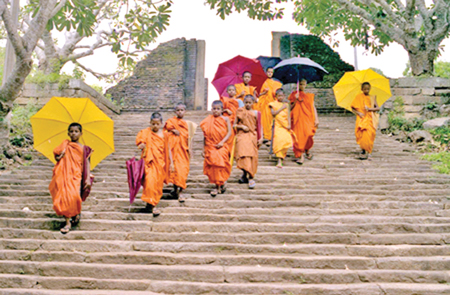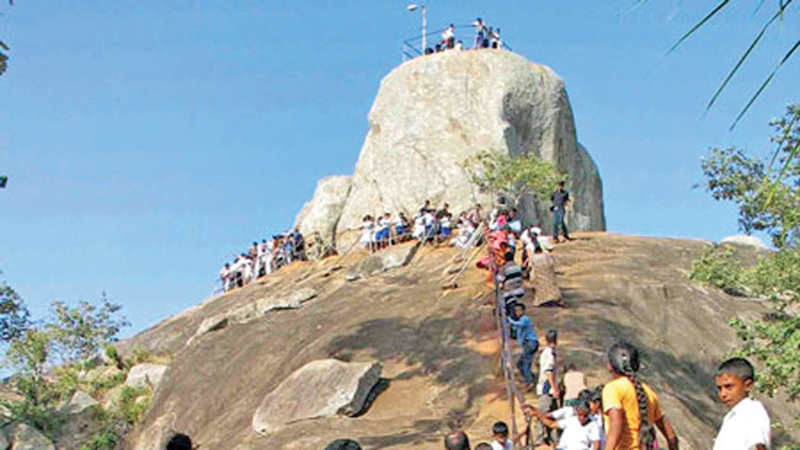 Legend has it that one fine Full Moon Poya Day nearly 2,330 years ago, King Tissa was hunting deer in a park close to the Royal City of Anuradhapura. Then he heard someone calling his name. Since no one in the country dared to call the King by his name, he turned upward to see just who could denigrate the King in this manner. It was a sight that immediately calmed him down – a retinue of saffron-robed bhikkhus and a sage.
Legend has it that one fine Full Moon Poya Day nearly 2,330 years ago, King Tissa was hunting deer in a park close to the Royal City of Anuradhapura. Then he heard someone calling his name. Since no one in the country dared to call the King by his name, he turned upward to see just who could denigrate the King in this manner. It was a sight that immediately calmed him down – a retinue of saffron-robed bhikkhus and a sage.
The visitor on top of the rock was none other than Arahat Mahinda Thera, son of Emperor Dharmashoka in neighbouring Jambudvipa, present day India. This rock later came to be known as “Mihintale” – basically the rock where Arahat Mahinda once stood.
Emperor Dharmashoka, a warrior who had given up war and embraced Buddhism, sought to spread the message of the Buddha to other lands. The island of Sri Lanka was the first choice.
Precious gift
With his father’s blessings, Arahat Mahinda had brought the precious gift of the Buddha, Dhamma to Sri Lanka. It did not take too long from that moment for the King and his 40,000 followers to embrace the timeless words of the Enlightened One after Arahat Mahinda Thera delivered the discourse on Chulla Haththi Padopama Sutta (Simile on the Foot of an Elephant). It is a Sutta in the Majjhima Nikaya (Middle-length Discourses of the Buddha of the Sutta Pitaka) that clearly explains the path to Nibbana, the ultimate goal of every Buddhist.
King Tissa earned the sobriquet “Devanampiya” (Beloved of the Gods) after he embraced Buddhism. This was the moment that started a Buddhism-based civilisation and an agriculture-based socio-cultural revolution in Sri Lanka that continues to this day. Thus Poson can be called a watershed moment in Sri Lanka’s rich annals. To Sri Lankan Buddhists, it is second in importance only to Vesak, which marks the Buddha’s Birth, Enlightenment and Passing Away. Sri Lankans celebrated Vesak on a grand scale last month.
While Sri Lanka has embraced a multi-ethnic, multi-cultural milieu, the tenets and ethos of Buddhism have permeated every level of our society, regardless of ethnicity and religion. Indeed, both Vesak and Poson are marked in various ways by non-Buddhists as well. Poson celebrations centre on Mihintale, where thousands of devotees converge to recall with gratitude Ven. Arahat Mahinda Thera’s journey to Sri Lanka bearing the precious gift of Buddhism.
Four Sublime States
It is the unique adherence to the Four Sublime States mentioned in Buddhism – Metta (Loving Kindness), Karuna (Compassion), Muditha (Sympathetic Joy) and Upekkha (Equanimity) that has enabled Sri Lankans to wither any obstacle in life, be it the 30-year War, the Boxing Day tsunami of 2004, the Easter attacks, the Coronavirus (Covid-19) pandemic, the 2022 economic downturn and political upheavals.
The Buddha Dhamma gave prominence to two factors essential for life – health and the environment. Sri Lanka just completed a week-long celebration of the World Environment Day which fell on June 5.
 The Buddha said that health was the greatest wealth as epitomized by the Pali stanza “Arogya Parama Labha”. This was not surprising, since the Buddha had realised the essential link between the two factors, having attained Enlightenment under the shade of a mighty Bo Tree.
The Buddha said that health was the greatest wealth as epitomized by the Pali stanza “Arogya Parama Labha”. This was not surprising, since the Buddha had realised the essential link between the two factors, having attained Enlightenment under the shade of a mighty Bo Tree.
Our affinity for Nature and the Environment goes back all the way to that initial interaction between Arahat Mahinda Thera and King Devanampiyatissa at Mihintale. This is why protecting the environment is literally second nature for Sri Lankans.
Arahat Mahinda stopped the King’s hunt, extolling that all life is precious and that we should radiate compassion towards all beings. The Buddha foretold all those years ago what the scientists are saying now with regard to biodiversity, which must be protected at all costs.
Arahat Mahinda also tested the King’s intelligence with questions about the mango grove in Mihintale, which the latter successfully answered. From then on, our Kings declared Abhaya Bhoomi or sanctuaries where life was allowed to blossom freely. Mihintale is a sanctuary to this day. This example too shows that Sri Lankans’ close affinity with Nature and the environment stems from Buddha’s teachings on the importance of every life, animal, plant or human.
The United Nations has warned that human actions, including deforestation, encroachment on wildlife habitats, intensified agriculture, and acceleration of Climate Change, have pushed Nature beyond its limit. It would take 1.6 Earths to meet the demands that humans make of Nature each year. If we continue on this path, biodiversity loss will have severe implications for humanity, including the collapse of food and health systems.
The emergence of Covid-19 and other such diseases has underscored the fact that, when we destroy biodiversity and interfere with Nature, we destroy the very systems that support human life. Ironically, Nature bounced back in a remarkable manner during the months of lockdown sans human activity, which in itself is a lesson for humanity.
Today, Nature is under severe strain due to a variety of factors from plastics pollution to fossil fuel use. Many of the animals and plants that we now take for granted could be gone from our midst in just 50 years. If we continue burning fossil fuels, our coastal cities could be inundated by 2100 as a result of Climate Change and an associated sea level rise. It is time for the world to work together to honour the commitments to the environment and save the only planet we have, at least until we develop the technology to reach other habitable planets in the universe.
The emergence of more diseases transmitted from animals has taught us another lesson – it is good for the entire planet and our health if we keep away from consuming animal flesh. The farming of animals for human consumption is resource-intensive and is known as one of the main causes of greenhouse gas emissions that cause Global Warming.
Abstinence from consuming animal flesh also resonates with the words of the Buddha and Arahat Mahinda, both of whom enunciated compassion for all beings. Thus Poson should be an occasion to align our lives with the sublime teachings of the Buddha and the paramount need to save our Planet. Even more than Vesak, Poson is an occasion to get closer to the Buddha Dhamma as it relates to our everyday lives.
State Poson Festival
This year, the State is extending full patronage to the Poson Festival after a hiatus of several years. The National Poson Festival will be held with full State patronage from June 8 (today) till 13 (Friday) in Anuradhapura and Mihintale, the cradle of Buddhism in Sri Lanka, under the theme “let the world gain peace through Arahat Mahinda Thera’s timeless message”. Poson Poya itself falls on Tuesday, June 10.
All National Poson Festival religious ceremonies will be held under the guidance and patronage of Mihintale Raja Maha Vihara Chief Incumbent Ven. Walawahengunawewe Dhammaratana Nayake Thera.
This is the first time since 2023 that the Government is extending State patronage to Poson activities in Mihintale. The Government has also assured all facilities for the pilgrims arriving in Mihintale during this period. Several dansalas will offer meals to the pilgrims. All liquor outlets in Anuradhapura and Mihintale will be closed during the Poson Week. Poson Poya programs will also be conducted at temples islandwide.






